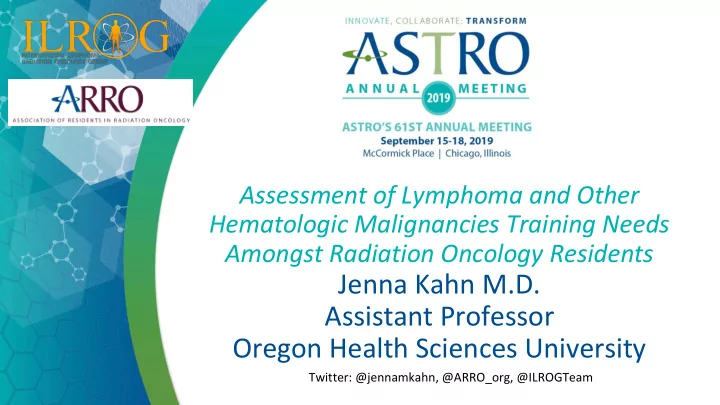

Assessment of Lymphoma and Other Hematologic Malignancies Training Needs Amongst Radiation Oncology Residents Jenna Kahn M.D. Assistant Professor Oregon Health Sciences University Twitter: @jennamkahn, @ARRO_org, @ILROGTeam
Objectives • Review training and exposure in hematologic malignancies for Radiation Oncology (RO) residents • Review resident training comfort level in treating hematologic malignancies • Future goals and options for Rad Onc resident training in hematologic malignancies • Mobilize the Heme Rad Onc Community Twitter: @jennamkahn, @ARRO_org, @ILROGTeam
Background • Use of radiation therapy in the management of hematologic malignancies is heterogeneous • Resident comfort is unknown: • 2013-2014, 30.3% of chief residents reported no or inadequate level of exposure for lymphoma malignancies • 2016-2019, ARRO Chief survey revealed 24% received adequate lymphoma training but more experience would be desirable** Twitter: @jennamkahn, @ARRO_org, @ILROGTeam
Materials/Methods • RO residents (PGY2-5) in the ARRO email database (n=572) sent anonymous survey • Questions were binary, Likert-type scale, and multiple choice Twitter: @jennamkahn, @ARRO_org, @ILROGTeam
Results/Outcomes • 134/572 residents completed the survey (23% response rate) Majority from programs >5 residents: 92% Majority responses from PGY4-5: 65% 8% 1-4 12% 17 or more 8% PGY-2 34% PGY-5 15% 13-16 28% PGY-3 34% 5-8 32% 9-12 31% PGY-4 Twitter: @jennamkahn, @ARRO_org, @ILROGTeam
Rotation Length and Focus • 84% had faculty who specialize in >50% Hematologic Patients Seen hematologic malignancies 5% I don’t know • 71% have a hematologic rotation, most common > 8 weeks long 40% Yes • Only 40% had a dedicated rotation (>50% heme patients) 55% No Twitter: @jennamkahn, @ARRO_org, @ILROGTeam
Patient Population • Resident reported number of cases Twitter: @jennamkahn, @ARRO_org, @ILROGTeam
Advocating in Tumor Board: How Comfortable Would Residents Be? 5% Extremely 14% Not at all 18% Quite 32% Somewhat 32% Moderately Twitter: @jennamkahn, @ARRO_org, @ILROGTeam
Clinical Decisions • Making clinical decisions once referred 5% Not at all 7% Extremely 21% Quite 31% Somewhat 36% Moderately Twitter: @jennamkahn, @ARRO_org, @ILROGTeam
Comfort with Contouring and PET/CT Incorporating PET/CT for treatment Contouring ISRT 1% Not at all 5% Not at all 16% Extremely 20% Somewhat 26% Extremely 18% Somewhat 34% Quite 29% Moderately 27% Moderately 25% Quite Twitter: @jennamkahn, @ARRO_org, @ILROGTeam
Specialized Treatment Techniques • Resident reported cases in specialized treatment techniques Twitter: @jennamkahn, @ARRO_org, @ILROGTeam
Resources
Overall Comfort to Treat Heme Malignancies 8% Not at all 7% Extremely 16% Quite 28% Somewhat 41% Moderately Twitter: @jennamkahn, @ARRO_org, @ILROGTeam
Formal Away Elective Interest and Why? 11% Other 6% Extremely 19% Not at all 18% Quite 25% I have a special interest in this disease site 65% I do not feel 32% Somewhat prepared to treat 25% Moderately heme patients Twitter: @jennamkahn, @ARRO_org, @ILROGTeam
Away elective rotation for radiation oncology residents New from Gain more clinical and technical experience with managing patients with hematologic malignancies Visit www.ILROG.com/resident-electiv e for more information Twitter: @jennamkahn, @ARRO_org, @ILROGTeam
Conclusions • There is a need for hematologic malignancy training • In fundamental techniques: • Breath hold and Contouring training deficiencies • <25% of trainees feel “quite” prepared to treat heme patients • One way to address these deficiencies is to create a dedicated heme electives • Select programs or hands on online educational activities Twitter: @jennamkahn, @ARRO_org, @ILROGTeam
Acknowledgements • ILROG Educational Steering Committee • ARRO Executive Committee • Jillian Gunther, MD PhD • John Plastaras MD, PhD • Joanna Yang MD, MPH • Joachim Yahalom MD • Chelsea Pinnix MD, PhD • Bouthaina Dabaja MD • Neha Vapiwala MD • Bradford Hoppe MD, MPH • Yolanda Tseng MD • Rahul Parikh MD Twitter: @jennamkahn, @ARRO_org, @ILROGTeam
• ACGME: • Requirement for rotation in specific disease site will likely be moving forward • Consideration of specialty specific minimums (still under review) • Could partner with smaller programs to offer this elective
Travel for an Away Elective • Would you travel? How far? 12% <50 miles 13% 50-250 miles 46% Yes 55% No 75% Does not matter as long as there is housing
Future of Education in Hematologic Malignancies
Recommend
More recommend